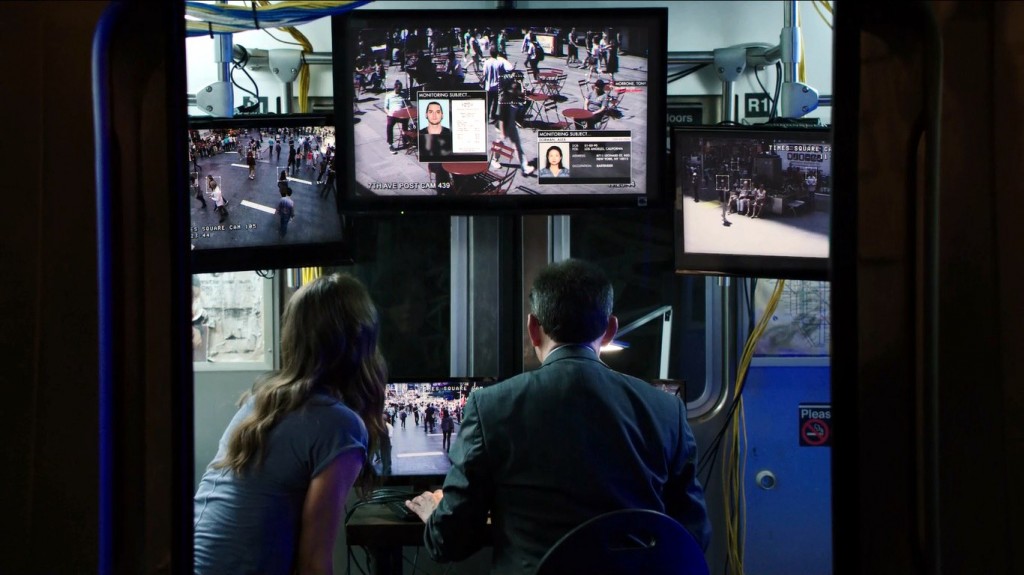“What do you become then?”
If Person of Interest had to be summed up in one macro idea, it’s redemption. John Reese starts the series as a washed-up assassin with no shortage of blood on his hands. Harold Finch is a reclusive genius carrying a guilt we don’t fully understand until later in the show’s life. When they meet Lionel Fusco (Kevin Chapman, Black Dynamite), their man inside the NYPD, he’s a corrupt cop who has no investment in anyone’s survival, save for his and his own. Only Carter comes across as someone relatively clean, serving as the moral center of the show. Eventually the team adds two others: psychiatrist Caroline Turing (Amy Acker, delivering the performance of her career to date) and black-ops soldier Sameen Shaw (Sarah Shahi, doing the same). All of them are living with crushing sin, and the inherent moral imperative of what they do rubs off on them.
The changes are subtle, because the missions don’t always directly reflect the internal struggles of the protagonists. This is better than it might sound on paper; it turns out that these writers are really, really good at crafting episodic television. With a few rare exceptions, even the most basic filler episode has some value to it: “Super” is a fun Rear Window riff that features an excellent turn from Dexter‘s David Zayas as a suspiciously charming building superintendent. “Bury the Lede” has Reese (who, after cracking so many criminal heads, gains Batman-esque notoriety as “The Man in the Suit”) dating an investigative reporter writing an exposé on him after her number comes up; the episode plays with Reese’s mythological stature by blowing it up into a full-on Superman / Clark Kent analogy. “Most Likely To…” has the team infiltrating a high school reunion. “Wingman” has blunt bridge-and-tunnel type Fusco getting made over by a professional “social liaison” who gets other men dates.
These episodes don’t do that much to advance the big story of the show (though nearly every episode provides an important piece of the puzzle), but it gives the characters some room to be defined by things other than overarching plot machinations. So when a number comes up that does reflect back onto a team member in a personal way—as it does in “Many Happy Returns,” “Razgovor,” “/ (Root Path),” or particularly “The Devil’s Share”—not only do those episodes feel supercharged, but it often gives the viewer a chance to realize just how different these people are from where they started, making the show’s take on redemption stand out from the myriad of shows that go to that well.
Put a shorter way, it’s Touched By An Angel with more kneecapping.
“I’m playing by different rules now.”
It’s not just about how well Person of Interest handles the concept of redemption, though. The show is deeply feminist; many of the strongest and most powerful characters in the show’s world are women. In a spoilery short essay for the POI Positivity Tumblr, my friend Seb argues that Reese, despite being the de facto hero of the show, is more of a beta male who looks up to the women in his life. You really shouldn’t read it
On the other hand, most of the women on this show are fiercely independent and are awesome for it. When it was first announced that Sarah Shahi was cast in the second season of the show, Jonathan Nolan described her character of Marine-turned-black ops contractor Sameen Shaw thusly: “If James Bond and Sarah Connor had a baby, Shaw would kick its ass.” He arguably understated it.
Shaw was introduced in “Relevance,” an episode that Nolan co-wrote and directed himself. It focuses entirely around Shaw—who carries out missions for the “Relevant” half of The Machine’s output—trying to take down the people responsible for an ambush that killed her partner. The main cast only makes ancillary appearances, and the result plays a little like the pilot of an action series that Shahi would star in.
If it was a pilot, though, there’s not an executive on this planet that would have passed on it. “Relevance” is a crowd-pleasing barnburner of an episode. If it had a little more money, a little less content restriction, and could stand entirely on its own, we’d be talking about it in the same breath as John Wick. Person of Interest did this, eschewing the main cast to give a new badass female character a spotlight, and it didn’t even blink.
The show also takes a progressive view toward sexuality; an early season 2 episode, “Critical,” has Reese and Finch trying to protect a surgeon and her wife from the machinations of a criminal mastermind. The relationship is taken at face value—there’s no Russell T. Davies-esque “did I just blow your mind” moment in sight. Later in the show’s life, Shaw and another female character get caught up in a surprising and shockingly endearing romance arc. It happens with practically zero fanfare, yet when it culminates, it’s a powerful, beautiful moment. In the world of Person of Interest, the gender of the person someone loves isn’t worth a second thought.
Excellent episodic content, great soundtrack, cool action, a strong emotional throughline, good representation…these are all hallmarks of a very good show. But the gauntlet I’ve thrown down sets Person of Interest as one of the best sci-fi shows on the air right now. What pushes it to that level?
“Set out to correct the world’s wrongs and you’ll almost certainly end up adding to them.”
If you happen to be sold on Person of Interest at this point—I mean truly, madly, deeply excited to jump in, not just “Cool, I’ll put it onto my endless backlog of shows to catch up on”—stop reading here and get to work. The initial unevenness of the show starts to get worked out by episode 7; episode 13 is a good point to decide whether or not this show is really your speed. However, what I’m going to talk about here has the strange distinction of being both absolutely necessary to any discussion of the show AND something best discovered on your own. So if you’re not fired up yet, read on while I give you a taste of just how deep Person of Interest‘s sci-fi roots run.
For most of the first season, the implications of The Machine’s existence are kept in the background, running at a low hum as to not overpower the other stories being told and characters or factions being set up. Those implications explode to the forefront in the penultimate episode of the first season, “No Good Deed,” credited to David Slack. (Slack’s name is on four of the other episodes I’ve namechecked in this piece. The man is a beast behind the keyboard; remember his name.) In the episode, Reese and Finch get the number of Henry Peck (Jacob Pitts, Justified), an NSA analyst who unwittingly discovered his reports being changed behind his back, adding names that led to the successful disruption of terrorist plans. He starts asking questions and is marked for death for his trouble.
It’s not long before he works out, on his own, that The Machine exists, and operatives connected to it have been adding the names to create an appropriate paper trail. “Our own government is spying on us,” Peck exclaims, a year before Edward Snowden blew the whistle on PRISM, while David Bowie and Trent Reznor’s “I’m Afraid of Americans” blasts on the soundtrack, “and they want to kill me for covering it up!” Later, he sits down with Finch, who tells Peck everything he needs to know about The Machine. “I’m Afraid of Americans” reasserts itself, but this time it’s the haunting coda of the song, repeating over and over:
“God is an American.”
Bowie wrote the song in response to the increasing encroachment of American culture upon the world. However, its use here reflects the horrific paranoia of those who know about and rely on The Machine before suggesting that The Machine itself is way more than a machine. Indeed, what Finch built is an artificial intelligence, its HUDs and quirks conveying a distinct personality. And an artificial intelligence with a zero percent error rate that watches the world and intervenes through messengers that cannot fully comprehend its intentions is, for all intents and purposes, a man-made god—more specifically, an American-made god. Our pain from 9/11 has led to this much hubris.
There’s a twist, however: The Machine is a benevolent AI, taught to respect the sanctity of human life, and it has learned very, very well. To be clear, there’s plenty of pop science fiction out there that doesn’t portray artificial intelligence as an inherent evil: Aliens, two-thirds of the Mass Effect trilogy, Moon, A.I., hell, Blade Runner. I’m sure there are many more that I’m simply not well-versed enough to list, including some obvious ones. But I think one can argue that if a story introduces an AI that has considerable reach and control, then the question, at least 80% of the time, becomes “So how’s it gonna fuck us?” Every time there’s some new advance in computer engineering, we don’t crack nervous jokes about Skynet over Twitter because we’re confident everything’s gonna be okay. To see a story where the AI that is persistently watching over us and directing people to act on its behalf is not out to kill us all is kind of refreshing.
So where does the show mine drama from? The Machine isn’t an antagonistic force, nor is it ever wrong. For an intelligent algorithm that violates our privacy on a regular basis, it works really well…and therein lies the problem. When a system like this works as well as it does, then the people the system works for will do everything they can to keep it working. People lose their lives over it. The ones who don’t lose everything that makes their lives worth living. For all the good The Machine does, there is a painful human cost to it, and the show never lets you forget it for long.
And that all happens before the private sector starts getting curious…but that can wait.
“Can you hear me?”
The final season of Person of Interest is in full swing. Between the ending of last season and the trailers for this season, the stakes have ratcheted up to apocalyptic proportions. Can the show stick the landing? It looks good, but then again it always does from a fan’s perspective. Endings are a bastard to write; only a handful of shows have unequivocally nailed them.
Either way, what started as a simplistic action series with sci-fi undertones has blossomed into a relatively grounded but otherwise full-fledged cyberpunk thriller, and you’ve got a little bit of time to find out how it got there. Once you do, it is damn likely that you’ll need to know how it’ll all end just as badly as I do.




